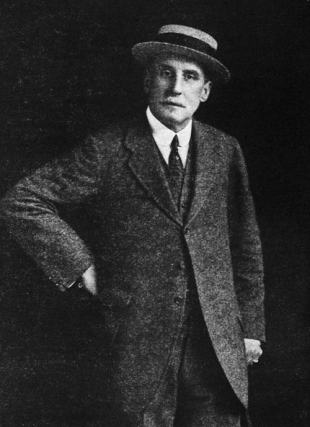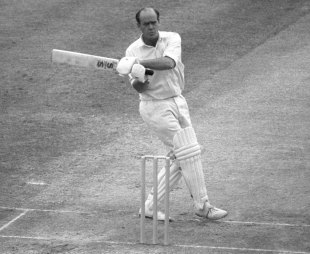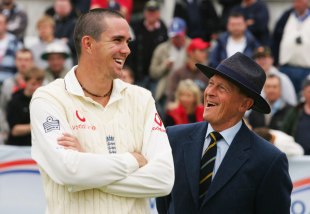No laughing matter
Duncan Hamilton

|
|||
|
Related Links
|
|||
At the rump end of 1933, an impish, greying and bandy-legged middle-aged man travelled by bus and on foot across the high-ridged toe of the Yorkshire Dales to make an unannounced house call. Under his arm he carried a brown paper parcel, which contained a belated wedding gift. He'd bought it especially for the groom; whether the bride liked it, wanted it or would find any practical use for it was immaterial.
The recipient was Bill Bowes, and the generous giver Emmott Robinson, who told Bowes on the doorstep what the thick wrapping concealed, so ruining the element of surprise. "I've brought you a weather glass, Bill," he said. "It's same make as mine, an' tha wants to look at it night and morning. It's seldom that I've been let down, an' it's nice to know when there's a sticky wicket in t'offing." Robinson wasn't being flippant: he spoke solemnly. As though regarding the barometer as the bowler's equivalent of the philosopher's stone, he began an elaborate description of its benefits. "He instanced matches when Yorkshire had sent the other side in to bat," remembered Bowes. "Occasions when a little more confidence in the barometer would have helped, and left the house with a parting injunction, 'Be sure that tha makes good use of it.'"
From a first-floor window in my home I can follow the curve of the rutted lane along which Robinson went, clutching that parcel. Poking between the trees I can see the Indian-red tiles of the roof of Bowes's old semi-detached, which overlooks the Wharfe valley. And, passing the front door, I imagine the two of them standing beneath the lintel. In my mind's eye, Bowes nods his surprised thanks and the garrulous Robinson gossips away in front of him.
It's an ostensibly minor moment; an obscure exchange that, I suppose, seems insignificant amid the brass-band-and-bunting celebrations arranged for Yorkshire's sesquicentennial summer of 2013. Landmark anniversaries are essentially about the remembrance of things past and, since history is made up of the biography of Great Men, Yorkshire have a lot to draw on. Old ghosts will be summoned: Lord Hawke and Wilfred Rhodes, F. S. Jackson and J. T. Brown, Schofield Haigh and Alonzo Drake. But I think the vignette about Robinson and the barometer contains something subliminally telling, and is useful in understanding three fundamental aspects about Yorkshire: how seriously they take their cricket; what it required to achieve the unmatched glory of 30 official Championships won outright, and another that was shared, grudgingly, during those 150 crowded years; and, improbable as this seems, why the county's long period of trophy austerity turned so poisonous and militantly rebellious.
No one was more authoritative about Yorkshire than J. M. Kilburn, who as correspondent of the Yorkshire Post, counts as the Herodotus of Tyke territory.
He either saw or knew, with a casual familiarity, almost everyone now honoured in Headingley's impressive museum. George Hirst coached him, speaking in a voice so hoarse that any instruction must have sounded like gravel pouring down a chute. He observed a padded-up Herbert Sutcliffe writing his correspondence in immaculate copperplate, stopping unperturbedly in mid-sentence when the pavilion bell obliged him to go out and bat. He counted Len Hutton as a friend; and Hutton reciprocated, also counting him as an educational tutor. He wrote about Brian Close as a callow teen, saw almost all Geoffrey Boycott's formative innings, and Ray Illingworth's first, tweaked, delivery. He said some of his grandest days were spent admiring "the rampant" Fred Trueman flattening the stumps.
Kilburn always maintained that Yorkshire's success was based on what he called "the many strivers, the bread and butter cricketers". Robinson belongs in that category. Statistically he doesn't rank among the greatest of the club's great. He didn't make his debut until 1919, aged 35, when he was called up to fill one of those tragic gaps created by the First World War. He retired, aged 47, in 1931 after taking 100 wickets in only one season and scoring 1,000 runs just twice. He was one of those figures whom P. G. Wodehouse - fond of the cricketing idiosyncratic - could have invented if God had not got there first. His cap was askew. He wore loose, wrinkled whites, each creased trouser leg rolled up as though, like a Scarborough holiday-maker, he was about to paddle into the North Sea. But, as the ultra-professional, Robinson had a scrupulous devotion to his business. Every evening he wrote his observations into cheap notebooks, compulsively accumulating intelligence which, he said, comprised: "Wheer t'batsmen got t'runs, how they got out, their best shots, state o' t'wicket an' stuff like that." He lived Yorkshire cricket 24 hours a day during the summer and thought about it all winter.

|
|||
Robinson strikes me as the personification of Yorkshire cricket's character. In approach, opinion and belief he also represents the way in which Yorkshire are seen by outsiders - and how they relish seeing themselves: earnest, thrifty, ruthlessly efficient and hard-bitten, intolerant of failure and possessing a never-give-summat-away-for-nowt attitude that no dictionary definition of competitiveness has ever adequately captured. Those attributes are not, and never were, exclusive to Yorkshire; but Yorkshire - through Robinson and his ilk, before and afterwards - embodied them more than the other counties, and treated the game with the greatest profundity.
The barometer is proof. Robinson thought minutiae mattered. He'd been schooled to explore and exploit any advantage, however minuscule. He was reminding Bowes of his duty to do the same, thus perpetuating the Yorkshire credo forged when Victoria was Queen, and "Spy" decorated Vanity Fair with caricatures of Grace and Spofforth. It hinged on two connecting philosophies: the impossibility of being too eager to win, and the indisputable fact that nothing else bloody mattered. However hoary and tattered by overuse, it is obligatory to quote that sentence synonymous with Yorkshire - "we don't play for fun" - simply because the stony phrase is convenient shorthand to explain their approach without the need for much elaboration. The more interesting aspect is how it became the first tenet of their faith.
The judgment of posterity constantly shifts. But Yorkshire are what they are because of Lord Hawke. When he became captain in 1883 every one of the regular XI counted as an alcoholic except Louis Hall, who was a teetotaller. Sir Home Gordon, Hawke's bosom buddy, described Yorkshire as "easy-going, self-indulgent", and "far too polite to run a man out". Hawke turned them into the Championship's first superpower through the imposition of his will and personality, which was benevolently patriarchal on the surface and harder than metamorphic rock beneath. Gordon insisted he once heard a Yorkshireman triumph in a cricketing debate over a Lancastrian with the finality of this declaration: "I know more than you anyhow, for I've shook 'ands with Lord 'Awke and that's more than you ever did."
The keystone of Hawke's success was a move so obviously sensible that you can only suppose his predecessors must have considered it as well, but were too timid or bone idle to implement the thought. Hawke decided to treat a pro like a pro, as opposed to some inferior subspecies. He secured winter payments for them and awarded "mark money" (dependent on his own scoring system of achievement) and decent bonuses to those he called "my dear boys". Just as a gentleman ought to do, he spoke about the morality of playing "in the proper spirit" and the need for "sportsmanlike unselfishness". But Hawke made Yorkshire slickly businesslike and gave them a corporate-style uniformity of purpose. When circumstances demanded, he also knew how to handle the axe: the boozers and the backsliders were got rid of - Hawke just cut them down. He sacked Joe Preston, so fond of his ale that he died at 26; Hawke's diagnosis of the cause was the coldly euphemistic "he had too many friends". Ted Peate went too, after gluttonous overindulgence caused him to swell to 16 stone. Also booted out was the perpetually inebriated Bobby Peel, who - it was claimed - tried to bowl from stump to sightscreen in a beery fug after assuring Hawke: "I'm in fine fettle this morning, m'lud." Peel is said - surely apocryphally - to have then urinated against the same sightscreen on his slow, zigzagged slump back to whence he had drunkenly come.
The inking of the plates to produce John Wisden's first Almanack and the official formation of Yorkshire were as near as dammit simultaneous and nicely serendipitous. Wisden has always been there to record that life at Yorkshire is seldom in equilibrium, and that their politics are complicated and often acrimoniously personal. In a game of word association the instant response to the utterance of "Yorkshire cricket" is likely to include the following: rows, rifts, rivalries, recriminations, upheavals, crises, civil wars. Even Hawke experienced these in the arm-wrestle between Leeds and Sheffield to determine which represented the beating heart in the Yorkshire body. This wasn't a polite kerfuffle of Victorian manners. In the 1890s, there were calls to sack a committee that reformers condemned as "effete" and "out of touch", which is archaeological proof - were any still needed - that trouble at t'mill brewed well before the more recent winters of discontent.
Everyone is entitled to be stupid on occasions; but Yorkshire, it must be said, have been guilty of abusing the privilege because of their tendency to always have breath to spare for a good argument. Think of the early to mid-1950s, when dressing-room disharmony - as much as the Surrey of Lock and Laker - left the county barren of titles. Think of the end of that decade, when Johnny Wardle dabbled with high explosives by disputing the decisions of his captain, Ronnie Burnet, and inevitably blew himself up. "Doesta think tha's been a fool, Johnny?" asked a pitman bluntly when Wardle spoke at a South Yorkshire Miners Institute in the aftermath of his sacking. "Aye, I have," he confessed. And think of some of the unedifying spectacles of the late 1960s, the 1970s and the early to mid-1980s, which led to the club looking like a ramshackle vehicle bearing an illustrious name. A lot of grown men, who ought to have known better, behaved like the stereotypical I've-had-it-tougher-than-thee Yorkshireman satirised by Monty Python.

|
|||
Headingley became the cricketing equivalent of the House of Medici. Divisive scheming obstructed the business of winning the Championship. The web of macho ideological power struggles and score-settling became so convoluted that the club strangled themselves with it. The bickering sounded puerile and self-serving then, and most of the decisions taken seem to defy every principle of common sense when analysed now.
Close was abruptly given the option of resignation or the sack after leading them to four Championships and two Gillette Cups. "How long have I got to decide?" he asked. "Ten minutes," came the reply. The committee had already prepared different statements to accommodate whichever answer he gave. In shock, Close later vomited. Illingworth was regarded as a rebel for wanting the security of a contract, and despatched with the curt, cruel instruction that he could "take any other bugger" with him when he left. John Hampshire found the sour atmosphere intolerable, and announced he was off to discover "if it was possible once more to find joy... in cricket". Trueman felt so isolated from Yorkshire - a jobsworth attendant even denied him access to the car park - that he wouldn't walk through the gate on principle.
In the matter of Boycott, the county seemed never to tire of hearing their own voice; nor did Boycott himself. His admirers worshipped him from the prayer mat. His detractors regarded him as the Tudors regarded Richard III. This provided splendid entertainment for the sort of voyeur who instinctively rubbernecks at a motorway pile-up. My favourite quote from the interminable period when the pro- and anti-Boycott factions were trying to reduce one another to pulp didn't come from a player or an official. Illingworth, back at Headingley as team manager, was told by Mrs Illingworth, sick of the strife and animosity her husband had to endure: "The day you come home from Yorkshire and tell me you're finished will be the happiest of my life."
Yorkshire struggled to cope with their loss of supremacy and had what was tantamount to a full breakdown. If there's a plea of mitigation to be made for those torturous seasons, it is this. No county feel the weight of their past as Yorkshire do, or the obligation to maintain their reputation. No county have such a regal sense of entitlement. And no county so strongly believe that identity, ego, independence and self-worth are at stake in their cricket. As a polymath, John Arlott could express this sentiment and mean it: "I've enjoyed cricket more and served it better for realising it was never the be-all and end-all of everything." No one ever said that in Pudsey.
The fact that Yorkshire have won only one Championship in 44 years makes winning another urgent. The current president, Mr G. Boycott of Fitzwilliam, is adamant about that. On assuming office he declared: "I know what the members value and that is Championship cricket." He was repeating only what Hutton and Sutcliffe and Rhodes had said before him; and what Hawke said before any of them. But I can hear someone - who long ago toted a barometer across God's Own Country purely for the sake of his beloved club - saying a loud "Amen" in agreement.
Duncan Hamilton is the award-winning author of Harold Larwood: The Authorised Biography of the World's Fastest Bowler

